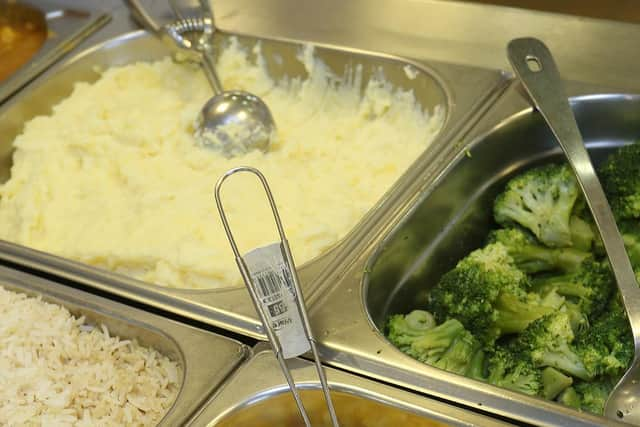Blackpool schools failing to dish up healthy school dinners inquiry finds
and live on Freeview channel 276
A survey of primary school lunch menus in the town found nearly a third were not complying with government set standards.
Now councillors plan to write to school governors challenging them to improve the menus available to children amid fears some youngsters are being given unhealthy choices.
Advertisement
Hide AdAdvertisement
Hide AdThe deficiencies came to light as part of a scrutiny by councillors into healthy weight.


The panel heard there were six different caterers supplying school lunches but the quality varied "greatly".
The panel's report adds "it is evident that a number of schools are not meeting the School Food Standards as required by central government".
Schools must meet rules to ensure children get enough fruit and vegetables, while food such as deep-fried dishes are strictly controlled.
Advertisement
Hide AdAdvertisement
Hide AdCoun Jim Hobson, chairman of the council's adult social care and health scrutiny committee, said: "I was absolutely astonished to find some of the schools were feeding our children food that doesn't meet nationally set standards.


"So I'm pleased the committee has decided to write to school governors. I was of the understanding that 15 years ago Jamie Oliver came in and changed school dinners."
The findings came about after a healthy lifestyles nutritionist from the council's public health team reviewed the lunch menus for Blackpool primary schools based on the information available from school websites last December.
The audit identified compliance across five key areas set out within the School Food Standards relating to provision of wholegrain food, starchy food, oily fish, meat and non-dairy protein.
Advertisement
Hide AdAdvertisement
Hide AdOut of 33 primary schools, 9 were non-compliant in four areas or more, 13 were fully compliant, there was no information for seven schools which did not publish their menus, and the other four had mixed outcomes.
Nutritionists now hope to work with schools to help them improve their menus.
Blackpool's director of public health Dr Arif Rajpura said: "The scrutiny committee is concerned over the level of non-compliance across Blackpool schools which is likely to be having a detrimental impact on the health and wellbeing of children across Blackpool.
"The school lunch time offer is a great opportunity to ensure our children receive at least one healthy meal a day.
Advertisement
Hide AdAdvertisement
Hide Ad"The public health team are keen to support schools to achieve this and help them understand their responsibilities for providing school lunches that meet the School Food Standards.
"Over the course of the next few months public health want to work with schools to review their menus and support their catering teams in achieving this standard."
Figures from the 2018/2019 National Child Measurement Programme show 28.6 per cent of reception children in Blackpool were overweight or obese, in comparison to the national average of 22.6 per cent, and up from 27.1 per cent from the previous year.
In relation to year six children (top year of primary school), 38.6 per cent were
Advertisement
Hide AdAdvertisement
Hide Adreported as overweight or obese in comparison to the national average of 34.2 per cent.
Government guidelines for school lunches include that menus should offer: -
One or more portions of vegetables and salad as accompaniment every day.
At least three different vegetables and three different fruits each week, and one or more portions of fruit every day.
Advertisement
Hide AdAdvertisement
Hide AdA portion of either meat, fish, eggs, beans and other non-dairy sources of protein every day.
Oily fish once or more every three weeks.
No more than two portions of deep-fried or battered food per week.
There are also strict controls around drinks to ensure pupils have healthier choices such as unsweetened juices, plain water of low fat milk.
The committee approved the scrutiny report which will now go before the council's executive on March 4.